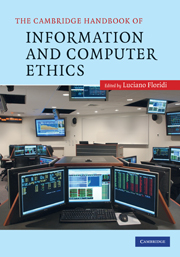Book contents
- Frontmatter
- Contents
- List of contributors
- Preface
- Acknowledgements
- Part I Introduction and background
- Part II Ethical approaches
- Part III Ethical issues in the information society
- Part IV Ethical issues in artificial contexts
- Part V Metaethics
- 15 The foundationalist debate in computer ethics
- Epilogue: The ethics of the information society in a globalized world
- References
- Index
15 - The foundationalist debate in computer ethics
Published online by Cambridge University Press: 05 June 2012
- Frontmatter
- Contents
- List of contributors
- Preface
- Acknowledgements
- Part I Introduction and background
- Part II Ethical approaches
- Part III Ethical issues in the information society
- Part IV Ethical issues in artificial contexts
- Part V Metaethics
- 15 The foundationalist debate in computer ethics
- Epilogue: The ethics of the information society in a globalized world
- References
- Index
Summary
Introduction
There are issues that are more abstract and basic than the substantive issues with which most information ethics theorizing is concerned. These issues are thought to be ‘foundational’ in the sense that we cannot fully succeed in giving an analysis of the concrete problems of information ethics (e.g. are legal intellectual property rights justifiably protected?) until these issues are adequately addressed.
(K. E. Himma 2007a, p. 79)Himma proposes one rationale for why foundational issues in information and computer ethics warrant philosophical analysis. Independently of whether his provocative claim can be substantiated, however, we will see that there are many compelling reasons for examining foundational issues in computer ethics (CE). We will also see that various models for understanding CE's foundational issues have been proposed and continue to be debated.
This chapter begins with a brief analysis of a model defended by Floridi and Sanders (2002) for examining foundational issues in CE via five ‘approaches’. Next, we propose an alternative model, which frames CE's foundationalist debate in terms of three principal questions. The remaining sections analyse these questions in detail. In proposing answers to each question, the chapter incorporates some insights from CE's leading theorists.
The Floridi/Sanders model
According to Floridi and Sanders (2002, p. 2), the foundationalist debate can be viewed as ‘a metatheoretical reflection on the nature and justification of CE and the discussion of CE's relationship to the broader context of metaethical theories’.
Keywords
- Type
- Chapter
- Information
- The Cambridge Handbook of Information and Computer Ethics , pp. 251 - 270Publisher: Cambridge University PressPrint publication year: 2010
- 5
- Cited by

